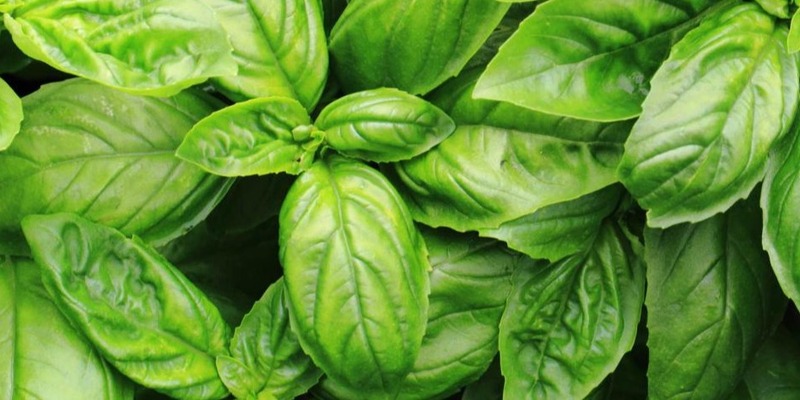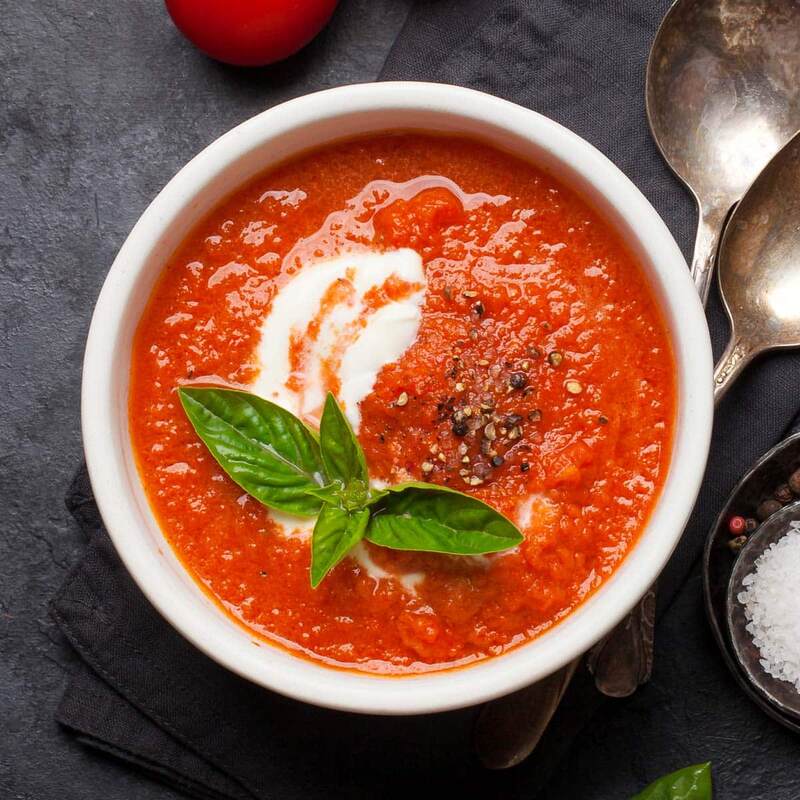Everything to Learn About Basil
Nov 28, 2023 By Madison Evans
Basil is a fragrant herb celebrated for its culinary and medicinal attributes. It is more than an enhancement of flavor in your favorite dishes. It offers numerous health benefits, and offers diverse uses, from garnishing salads to infusing oils. It can be added to almost any recipe and it will enhance the flavor more. Its health benefits coupled with culinary uses make it a fan favorite.

Basil Benefits
Steeped in a rich tapestry of history and cultural significance, Basil is an active contributor to holistic well-being. It offers multifaceted advantages that extend across the spectrum of health; it notably impacts diverse facets of the human body.
Immune System Support:
Basil's primary strength resides in its capacity to fortify the immune system. Loaded with crucial nutrients, such as Vitamins A and C, it operates as a natural enhancer of immunity. This reinforces our body's defenses against everyday illnesses and infections, an invaluable asset for overall health maintenance.
Stress Relief:
The prevalent concern in modern life is stress, but Basil emerges as a natural stress reliever. Rich in compounds such as eugenol with its anti-anxiety properties, basil can exert a calming effect on the nervous system. This promotes both relaxation and mental well-being, essentials of our bustling existence today.
Anti-Inflammatory Properties:
Compounds such as flavonoids and volatile oils house anti-inflammatory properties in basil, which actively mitigate body inflammation. This synergy potentially offers relief from conditions associated with chronic inflammation.
Blood Sugar Regulation:
Basil may provide valuable support for individuals conscientious of their blood sugar levels. Studies propose that compounds, specifically polyphenols, in basil have the potential to regulate blood sugar levels. Consequently, incorporating basil into a diet could be advantageous for people managing diabetes or insulin resistance.
Antioxidant Defense:
Basil, a rich source of antioxidants such as beta-carotene and flavonoids, plays an essential role. It neutralizes harmful free radicals within the body. Its presence contributes to cellular protection, potentially mitigating the risk of chronic diseases; moreover, it bolsters overall health.
Digestive Wellness:
Incorporating basil into the diet can benefit the digestive system, which is a cornerstone of overall health. Basil potentially aids in fostering healthy digestion. It reduces gut inflammation and promotes efficient food movement through the digestive tract.
Embrace basil for its health benefits: in doing so, you unveil a natural reservoir of wellness support. This ranges from fortifying the immune system. It extends to mitigating stress and beyond, demonstrating how versatile and valuable an addition basil can be for those with health-conscious lifestyles.
Elevate Your Culinary Experiences
Basil Uses in Cooking:
Basil, a versatile herb in the realm of culinary arts, imparts a distinctive aroma and flavor to numerous dishes. The kitchen employs basil for these fundamental uses:
Seasoning Soups and Sauces:
With their fresh and herbaceous notes, the fantastic addition of Basil's aromatic leaves enhances various soups and sauces.

Salad Enhancer:
Not only does tossing a handful of fresh basil leaves into your salads add an explosion of flavor, but it also injects freshness and vibrancy into the dish.
Pizza Perfection:
Basil leaves, a classic topping for pizzas, harmoniously complement the richness of tomato sauce and cheese, thus creating an exquisite blend of flavors.
Herbaceous Marinades:
Consider the delightful twist that chopped basil can achieve if you infuse meats and vegetables with its aromatic essence in marinades.
Infused Oils and Vinegar:
Design your basil-infused oils or kinds of vinegar. Drizzle them over salads, and grilled vegetables, and even use them as a dipping sauce for bread. The potential knows no bounds.
Delightful Basil Recipes:
Recipe 1 - Classic Basil Pesto:
Ingredients:
- Fresh basil leaves
- Pine nuts
- Parmesan cheese
- Garlic
- Olive oil
Method:
- Blend basil, pine nuts, Parmesan, and garlic in a food processor.
- Gradually add olive oil until a smooth paste forms.
- Toss with pasta or use it as a flavorful spread.
Recipe 2 - Caprese Salad with Basil Vinaigrette:
Ingredients:
- Fresh tomatoes
- Mozzarella cheese
- Fresh basil leaves
- Balsamic vinegar
- Olive oil
Method:
- Arrange tomato and mozzarella slices on a plate.
- Drizzle with a mixture of balsamic vinegar and olive oil.
- Garnish with fresh basil leaves.
Recipe 3 - Basil Lemonade:
Ingredients:
- Fresh basil leaves
- Lemons
- Sugar
- Water
Method:
- Make a simple syrup with sugar and water.
- Mix with freshly squeezed lemon juice.
- Add basil leaves for a refreshing twist.
Recipe 4 - Basil and Garlic Grilled Chicken:

Ingredients:
- Chicken breasts
- Fresh basil
- Garlic
- Lemon juice
- Olive oil
Method:
- Marinate chicken in a mixture of chopped basil, minced garlic, lemon juice, and olive oil.
- Grill until fully cooked.
From traditional pesto to refreshing salads and innovative beverages, these recipes showcase the diverse ways in which basil can elevate your culinary creations. When you experiment with these concoctions, you not only unlock a deeper appreciation for basil's aromatic and flavorful contributions to your kitchen but also gain an enriched understanding of its versatile potential.
Basil Nutrition:
Vitamins in Basil:
Explore how the essential vitamins in basil, such as Vitamin K - playing a crucial role in blood clotting, and Vitamin A known for its contribution to eye health, can fortify your body's overall nutritional intake. Basil serves as an abundant source of these beneficial nutrients.
Minerals in Basil:
Explore the mineral composition of basil, uncovering fundamental elements like iron, calcium, and magnesium. Each plays a unique role in bodily functions. Iron enhances blood's capacity for oxygen transportation.
Calcium fosters robust bone health, while magnesium facilitates numerous biochemical processes. It is crucial to integrate these minerals into your diet via basil consumption.
Antioxidants in Basil:
Investigate the antioxidant properties of basil, which we attribute to compounds such as flavonoids and polyphenols. These antioxidants critically neutralize free radicals within our bodies; this action potentially minimizes oxidative stress.
Potential Side Effects of Basil:
When consuming basil in larger quantities, a generally well-tolerated herb, you must scrutinize its potential side effects. It remains essential to comprehend these considerations for the sake of sustaining an approach that is balanced and healthy toward incorporating basil into your lifestyle.
1. Allergic Reactions:
Sensitivity to plants in the Lamiaceae family, such as basil, might provoke allergic reactions in certain individuals. The spectrum of symptoms spans from mild manifestations like itching or skin rashes to more severe responses including difficulty breathing.
Therefore, if you acknowledge a known sensitivity, you must exercise caution and consult with your healthcare professional before consuming basil.
2. Blood Clotting Concerns:
Compounds within Basil may potentially affect blood clotting. However, this influence generally remains mild. Individuals afflicted with bleeding disorders or using anticoagulant medications should exercise caution in their consumption of basil.
3. Interaction with Medications:
Like many herbs, basil may interact with specific medications: those for diabetes or hypertension. Individuals consuming such medicines should monitor their basil intake. It could potentially impact blood sugar levels or blood pressure.
Therefore, informing your healthcare provider about the extent of your basil consumption becomes not just advisable but crucial, ensuring compatibility with prescribed medications is paramount at all times.
4. Potential Gastrointestinal Issues:
Consuming excessive amounts of basil may, in some cases, induce gastrointestinal discomfort. Symptoms might encompass nausea, stomach cramps, or indigestion. Moderation is the key to prevention. It requires adjusting the quantity based on individual tolerance.
5. Pregnancy and Basil Consumption:
Basil consumption warrants caution for pregnant women. Although culinary uses of basil in small quantities generally pose no harm, the advisability of consuming basil supplements or concentrated forms remains questionable. Hence, pregnant individuals must consult their healthcare providers to discern an appropriate and safe level of intake.
6. Photosensitivity:
After consuming basil, some individuals may experience heightened sensitivity to sunlight, a reaction that becomes more prevalent with the topical application of basil oil. If you are prone to sunburn or skin reactions, exercise mindfulness regarding prolonged sun exposure following the use of skincare products containing basil.
Awareness of these potential side effects empowers you to reap basil's benefits while mitigating associated risks.
Consulting with a healthcare professional always remains advisable, particularly if pre-existing medical conditions exist or medications are being taken. This step ensures that your incorporation of basil aligns optimally with overarching health goals.
Conclusion
Conclusively, basil's benefits transcend its mere culinary applications. They span a vast range. It not only bolsters your health but also infuses an explosion of flavor into your dishes, thereby proving itself as an invaluable addition to one's lifestyle.
Embrace this herb's versatility, delve into experiments with recipes, and savor how profoundly it can uplift your well-being.







